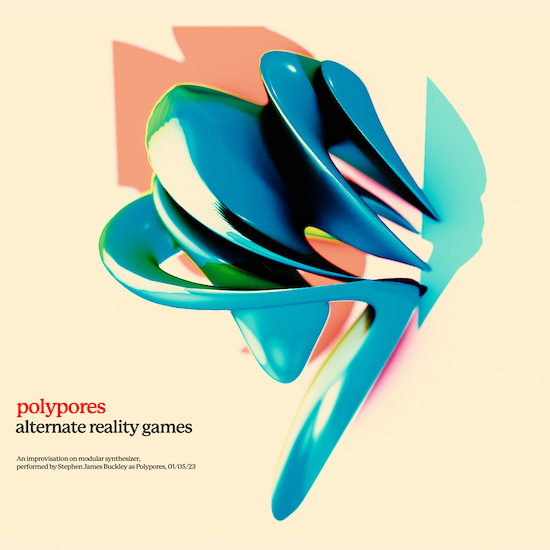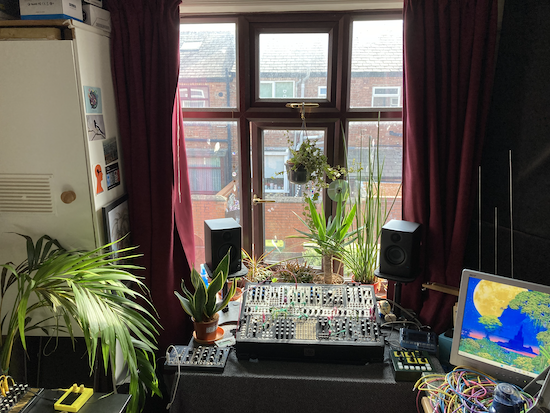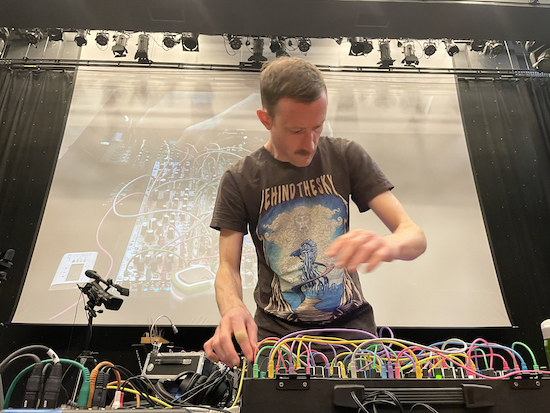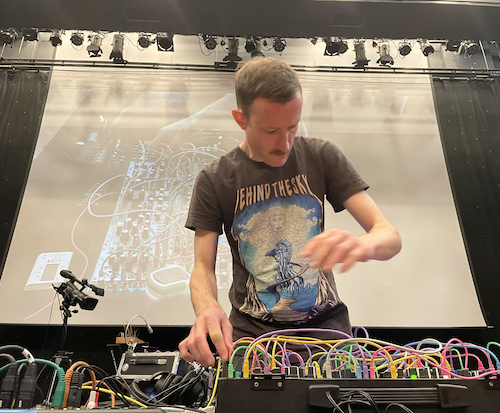To receive Alternate Reality Games by Polypores become a Quietus Sound + Vision subscriber
“It’s an alternate reality. An environment that takes me out of the mundane,” says Stephen James Buckley, aka Polypores. He’s speaking about his home studio built in a spare room in his terraced house in Preston, but he could just as easily be referring to his music. Rooted in synthesis, Polypores music is colourful, doused in optimism yet never cloying or fluffy. These tracks suck you in and make the quotidian peel away. Describing his output as escapist doesn’t quite capture its effect, which is to carve out space where sensation can be embraced rather than attempting to numb the senses or mute surroundings.
The glistening arpeggios and crystalline textures of recent albums sit somewhere between late-period Emeralds and more new-age associated electronic composers such as Pauline Anna Strom. His tracks have a distinct fluidity, a sense of being unbounded. That comes across clearly in the live set he’s recorded for tQ and titled Alternate Reality Games, a shapeshifting mesh of modular tones and sequences that constantly accelerates and decelerates. Like all of his music, it was recorded in his spare room.
“In an ideal world I’d be on the edge of a jungle overlooking a beach, but you can’t get that in Preston on my budget,” he jokes. “My window looks out on a back alley, old mill houses, Victorian terraced streets. The most unremarkable scene you can look out on. It feels like a portal. I’m on the other side, in a realm where I make music.”
He suggests his studio space performs a function similar to a shrine, but he’s cautious when talking about spirituality, more specifically, he’s wary of coming across like ‘Rock ‘n’ Roll Creation’-era Spinal Tap.
“There is a crossover between spirituality, music and magic. There are places they intertwine. I think that’s where ideas and creativity come from,” he says. “Altered states, or other things people do to reduce their contact with mundane reality, put you in touch with what could be classed as a spiritual realm, or your own subconscious. However you describe it, it almost has the same results. It lets you create something uniquely yours.
“There’s a taboo, especially if you’re coming from the Western white rock and pop background; spirituality in music is frowned upon, because of associations with Christian rock. Rock music was my main thing when I was younger. But when you move out of that, there’s some incredible music that’s been spiritually inspired, whether it’s jazz or Indian ragas. If you turn your nose up at spirituality in music, you’re missing out. I’m not claiming I’m as spiritual as the people making that music. I’m very much just paddling in the pool. It’s something I’m learning about.”

Buckley started Polypores in 2015 after completing some more song-based projects, both on his own and in bands. The move was, partly, motivated by an increasing frustration with writing lyrics, feeling he couldn’t capture what he wanted to convey through words anymore. Where early Polypores’ works, such as 2015 EP The Investigation, are relatively structured, multi-tracked instrumentals using drum machines and synths, his practice has since become increasingly rooted in improvisation and intuition. He considers Sun Ra, Alice Coltrane and Pharoah Sanders among his current influences.
“Music and art has something special, for me, when it’s done from a raw place without too much thinking,” he explains. “There’s a finite amount of energy, a spark. I need to grasp it and use it when it’s there. When I used to paint as a teenager, I hated using oil paint because I had to wait for it to dry. So I went to acrylics, because I could smear it; I could mix it on the canvas, then it dries and it’s done. That’s the feeling I’m trying to get across.”
As well as music, Buckley talks enthusiastically about books. He mentions Robert Anton Wilson’s Cosmic Trigger as a significant turning point in his thinking, helping him “embrace the power of maybe”. Around the time of recording his live improvisation for tQ, he was immersed in Ong’s Hat: The Beginning by Joseph Matheny. The book tells the story of one of the first alternate reality games, where Xerox mail art and zines were used to create a far-spreading collaborative fiction about a team of renegade scientists who’d mastered inter-dimensional travel.
“He made these fake pamphlets and book catalogues, but it also spread in the early days of the internet. It’s a conspiracy theory, some people thought it was real, some didn’t. Reading those original texts was really inspiring for me. There are amazing descriptions of different environments, or the science they used – mixing quantum physics, chaos theory, chaos magic, tantric yoga.
“There’s a dark side to it of course, you can see the origins of something like QAnon, when a fiction is created and spread through the web and other people feed into it. It can take on a life of its own and that’s had disastrous consequences. But I became obsessed with the book, the way the game tried to change how narrative worked. I try to lean into this with the music.”

Buckley’s home studio
A sense of excitement and possibility bleeds through the live improvisation, which was captured in a single take with no overdubs. Beginning with a splatter of electronic chirps and a doomy bass drone, that low end portent morphs into a springy melody. Seven minutes in, the opening flurry subsides and a taut arpeggio shifts the momentum. From there, the track erupts in different tangents, switching pace on a whim as if trying to fold spacetime in half. It feels immersive, but never static.
For Buckley, the track is part of what he describes as the third era of Polypores, distinct from the more gridded, layered and tweaked initial phase, while also separate from a more slow-moving, ambient period. “When I was playing the dronier material live I felt uncomfortable, like I wasn’t expressing myself. I’ve seen people performing that kind of music in amazing ways, Ian Boddy or Field Lines Cartographer – it’s very hard to do. Maybe it’s my rock background. When you’re in a band you’re always jumping around and doing something, you’re not twisting a knob slowly,” he says. “I’m a very excitable person and I feel that comes across now. It’s in the piece I’ve done for The Quietus. That energy is what’s in me rather than moving in a slow stately way. It’s an expression of my experience of the world.”
One lens to view Polypores’ music through is surroundings. Not as background texture, but capturing a sense of what makes a certain place or situation unique. Praedormitium¸ released earlier this year on Castles In Space, is a twinkling, high definition record which Buckley says reflects the feeling of a particularly frosty yet vibrant winter. ECCO, released this month on Frequency Domain, is a woozy, saturated affair where scuffed samples crawl amongst looming washes of synth. Recorded last summer, it was informed by the humidity of the heatwave.
“Polypores music reflects being overwhelmed – by things I find beautiful, intriguing or inspiring. It’s a feeling that’s otherworldly. It’s too much in a good way. Like there’s a charge running through you.” He suggests that this is the source of the unstable energy that bleeds through many of his recent works, and perhaps speaks to the new track’s wonderfully unstable ictus. “If you’re walking through the woods there are sounds speeding up and slowing down. Organic life doesn’t move on a rigid timeline. If you focus on one bit of the environment, there’s so much going on. Even in a city, there’s such a range of sounds. That’s what inspires me. I’m trying to wrangle as much sound as I can out of this machine.”
To receive Alternate Reality Games by Polypores as well as a host of other benefits including exclusive essays, podcasts and playlists, and loads more specially-commissioned music, become a Quietus Sound + Vision subscriber. You can do so here



